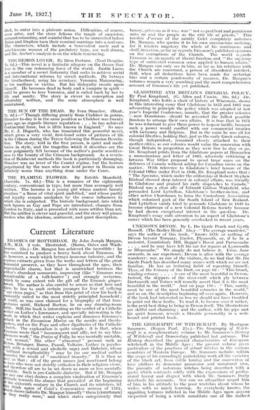Current Literature
ERASMUS OF ROTTERDAM. By John Joseph Mangan, M.D. 2 vols. Illustrated. (Burns, Oates and Wash- urne. 25s.)—Dr. Mangan has achieved the incredible : he contrived to produce a heavy book about Erasmus, It
however, a work' which betrays immense industry, and the pious extracts given from the works and letters of the great umanist preserve, as they have throughout the ages, their mperishable charm, but that is sandwiched between the itor's abundant comments, improving (like " Erasmus was nsiderable of a tuft-hunter '') and strongly sectarian, hick to some extent rub the gilt off the Erasmic ginger- ad. The author is also careful to as-sure us that here and re he has to omit certain passages for fear of sullying our clean pages," so that from this point of view his book is rninently suited to the most strictly principled household ; could, as was once claimed for a biography of that tern- stuous spirit, Richard Burton, lie on any drawing-room ble. Still,the book is interesting as the verdict of a Catholic
ter on Luther's forerunner, and specially interesting is the
ode in which that writer explains and dismisses Erasmus's . Back in the Enconiium Moriae on the monks and theolo- rs, and on the Pope and other dignitaries of the Catholic nrch. The explanation is quite simple : it is that, when easinus wrote that " inconsequent and silly, not to say bias- emous work," the Praise of Folly, he was mentally unstable, not normal," like other " abnormal " persons such as rren, Beranger, Burns, Pascal, Voltaire, Luther (a psycho- th with a sexual and alcoholic urge) and Rabelais, whose brilliant inexplicability " may be (so our medical author zards) the result of emotional' insanity." It is then as sy as that : all of the great names just mentioned belong men who were not strictly orthodox in their religious views, d therefore all are to be set down as more or less mentally • tile. Such is pro-Catholic dialectic. But if Dr. Mangan any one else) desires a complete vindication of Erasmus's itude towards the abuses that prevailed at the beginning the sixteenth century in the Church and its ministers, let think again of Colet's Convocation sermon of 1512, leh shows (admits Dr.-Mangan himself)." them Echmcluner4 - ineY really were," and which states categorically that heresy, grievous as it was, was " not so pestilent and pernicious unto us and the people as the evil life of priests." This terrible J' accuse of • the saintly Colet completely unhorses Dr. Mangan, who quotes it to his own unconscious undoing, for it renders nugatory the whole of his continuous and shrill invective, so far as regards Erasmusla published opinions on the corruptions of the Church. The world regards Erasmus as an apostle of liberal freedom and " the supreme type of cultivated common sense applied to human affairs." Dr. Mangan can only see in him, as far as his relations with the Church are concerned, a person of 'disordered intellect. Still, when all deductions have been made for sectarian bias and a certain ponderosity of manner, Dr. Mangan's volumes remain a very searching and the most comprehensive account of Erasmus's life yet published.


























































 Previous page
Previous page